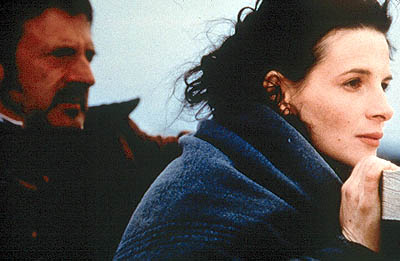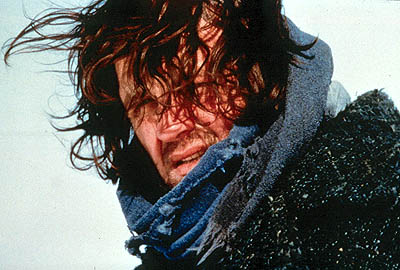The Widow of St. Pierre
La Veuve de Saint Pierre


The title of The Widow of St. Pierre can refer to many things, one of which may or may not be Juliette Binoche's (Chocolat, Alice and Martin) character. She is Madame La, the wife of the Captain (Daniel Auteuil, The Girl on the Bridge, The 8th Day). In times past, a 'widow' was slang in French for a guillotine, an instrument that plays a prominent role in this movie. Patrice Leconte (The Girl on the Bridge, Ridicule) directs and Claudo Faraldo (Bof, Thermoc) adapts the movie from actual events that took place on the then French island of St. Pierre, off Newfoundland in 1850. It is a simple story with profound implications, one that is still relevant today.
The Captain and Madame La are progressive thinkers in a small community. They keep to themselves, out of both their own accord and the wishes of others. This separation initially increases when the Captain assumes charge of Neel Auguste (Emir Kusturica). While in a drunken rage, Auguste murdered a local man and received the death sentence. Local officials wrote to France requesting a guillotine, and the Captain was to watch over him as a prisoner. Because of trouble acquiring a guillotine and the long journey necessary to transport one, Auguste is guaranteed to live for quite some time. The setting is bleak and lets the acting shine through. Little vegetation grows in the area, and few colors exist besides white, blue and gray.
La begins a slow friendship with him, entrusting him with growing a garden and other small tasks around the house. As time passes, he does more, both for the Captain and La and the local community. The people around him grow to love him. He is a changed man. The Captain gives him much freedom, much to the consternation of the officials. Now, nobody will volunteer to execute him, and if the execution proceeds on schedule, there will be an uprising. Through all this, Auguste and the Captain both resign themselves to Auguste's impending fate. Is it correct to kill a man who so clearly reformed himself and his actions? Leconte presents the moral dilemma, and then gives no clear idea of where it will lead. The most refreshing element of The Widow of St. Pierre is that viewers have no idea what will happen at the end. Will Auguste live or die?
La describes both men as 'fatalists.' They do what they can to change things, but ultimately it is not clear whether they think their actions will succeed. La's relationship with Auguste is like that of mother and son. She cares deeply for him and is willing to overlook his one (large) mistake. Her compassion is what changes him for the better. Binoche, Auteuil, and Kusturica all act strangely detached and withdrawn. They never fully vocalize their thoughts, which can be frustrating at times, but also makes them more mysterious. Binoche and Auteuil are great actors, and this film demonstrates why. They go just far enough to convey difficult emotions. The Widow of St. Pierre demonstrates more than Chocolat why Binoche deserves an Oscar nomination, and should give Auteuil the higher profile he deserves.